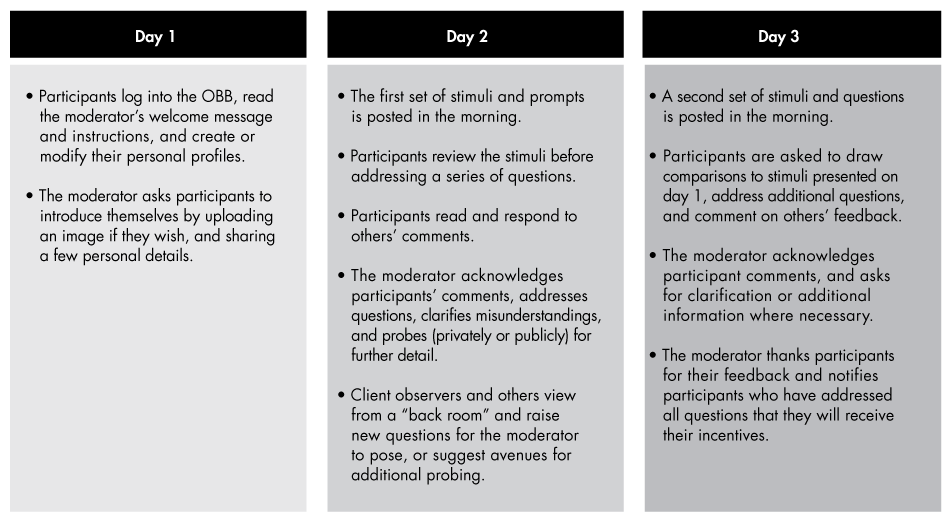Expert Commentary
When the use of the Internet to support qualitative group research was still something of a novelty, almost two decades ago, scholars and professionals debated whether “the online environment” was “a legitimate addition to qualitative methodologies”i. Today, the question has become moot. Chat-style, webcam-based, and bulletin board-type focus groups have proliferated. Some market research professionals might still dispute the merits (speed, reach) and shortcomings (superficial, impersonal) of online group research. For most, however, these digital formats serve as viable options, and the primary consideration is how best to use them.
An online bulletin board (OBB) is essentially a discussion forum in which 15 or 20 participants engage in conversation around questions posed by a moderator over consecutive days or weeks. Incentives are contingent upon participants’ active involvement in the forum, such as addressing all questions and moderator probes. The researcher prompts participants for detailed feedback around particular visual and narrative stimuli, including websites, advertisements and prototypes. Participants log in, record their responses, and reply to postings by the moderator or others at their convenience. Typically, the researcher asks the participants to visit the forum a couple of times each day. He or she often programs the primary questions in advance and sets up an automatic posting at pre-determined times. Below is a classic three-day concept testing sequence.

Online versus face to face
OBBs offer several advantages over face-to-face groups:
- Savings on incentives, travel, facilities and related costs;
- the ability to convene geographically dispersed or lower-incidence recruits;
- an anonymous forum for discussion of sensitive topics;
- immediate availability of transcripts;
- ample time for participants to digest and reflect on complex stimuli;
- continuity through a testing period of days or weeks;
- blinded responses, as researchers can program questions so that participants cannot view others’ comments until they have posted their own. This feature addresses the phenomenon of “groupthink” in face-to-face focus groups.
- the ability for the moderator to follow up privately on individual participants’ responses.
As with any text-based qualitative research format, however, the biggest drawback of OBB groups is the loss of non-verbal cues that enliven discussion and enrich verbal data in in-person and, to a limited extent, webcam focus groups.

Advanced Analytics Expert Commentary
Success with advanced analytics requires both technical know-how and a thoughtful approach. In this series, Bain's experts offer practical advice on some of the most common data issues.
When to use OBBs
Specific project goals and constraints determine whether a researcher chooses an OBB over the in-person format. OBBs lend themselves to the following situations:
- You don’t need to collect non-verbal participant data.
- Participants will benefit from digesting and reflecting on stimuli at their own pace.
- Target participants are geographically dispersed or difficult to recruit.
- It is valuable to follow the same participants over an extended period. In product testing, for instance, researchers might send samples to participants and then collect feedback over a period of time.
With the goal of generating rich qualitative data from OBBs, several principles are worth keeping in mind.
First, the kind of interpersonal dynamism that generally characterizes in-person focus groups can also characterize OBBs, but you must more actively engineer participant interactions. You can require or give incentives to participants to read and respond to others’ comments and moderator probes. And you should factor in time for participants to build rapport with one another through general introductions and an icebreaker exercise.
Second, building trust between participants, even in an impersonal space, is essential to generating honest feedback. It helps to offer a more detailed and perhaps personal introduction than is necessary, and to model ideal behavior. For example, you can respond with more verbal (here, textual) feedback, and possibly use emoticons.
Third, avoid being an overly intrusive presence, which risks biasing feedback. In contrast to the minimal interference that moderators practice in face-to-face groups, OBB participants may interpret the absence of regular moderator responses as indifference. Strike a balance between facilitation and allowing participants to establish meaningful dialogue among themselves.
Finally, as with any research method, “garbage in, garbage out” holds true. Design neutral, open-ended questions that invite relevant and elaborated responses.
By adhering to these principles, researchers will harvest rich insights from their online groups.
i Mann, Chris, and Fiona Steward. 2000. Internet Communication and Qualitative Research: A Handbook for Researching Online. London: Sage.
Aimée Douglas is a senior specialist in Bain & Company’s Advanced Analytics practice. She is based in Boston.